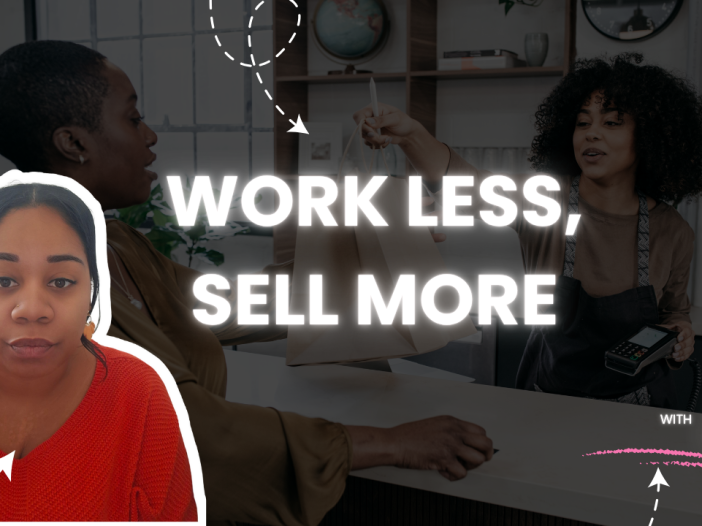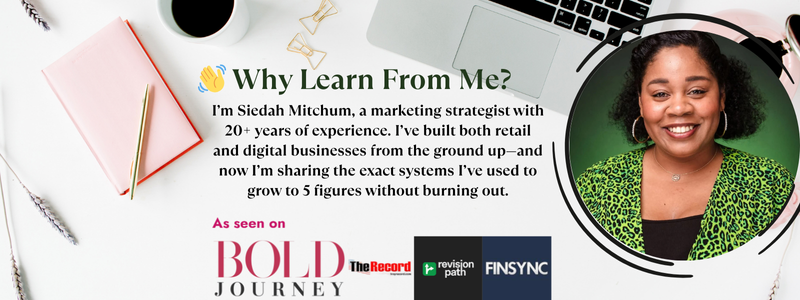
What If Your Retail Business Could Run Without You?
What if your retail business could run smoothly — even when you’re not there?
Because the truth is, the difference between burnout and balance comes down to one thing: systems.
Most retail store owners don’t realize it, but the reason they’re exhausted, overwhelmed, or stuck doing everything themselves isn’t because they lack motivation — it’s because they lack structure. Systems turn chaos into consistency, and consistency is what builds a scalable, stress-free business.
In this post, you’ll learn the exact systems that help retail business owners save time, increase profits, and finally step away without the stress.
Why You Need Systems in Your Retail Business
“If you’re still running your retail store from memory, that’s not a business — that’s survival mode.”
Running a retail store means juggling inventory, staff schedules, customer service, marketing, and finances — all while trying to stay sane. Without systems, every day feels like a guessing game. You wake up and react to problems instead of confidently leading your team.
Here’s the truth:
-
Systems give structure to the chaos — they turn daily fires into repeatable processes.
-
Without systems, you’ll always be working in the business, not on it.
-
With systems, your staff knows what to do — even when you’re not around.
-
Systems create consistency, and consistency builds trust — which increases sales.
Every successful store you admire — from local boutiques to major retail brands — runs on clear, repeatable systems. The question is, are you ready to build yours?
How Systems Help You as a Retail Business Owner
“The goal isn’t to do more — it’s to do less, better.”
Let’s be honest. You didn’t start your retail business just to spend every weekend doing inventory or answering DMs. You started it to have freedom — financial freedom, creative freedom, and time freedom.
Here’s how systems make that possible:
1. They give you data clarity.
You’ll always know what’s selling, what’s not, and when to restock. Instead of guessing, you’ll make smart decisions based on real numbers.
2. They save mental energy.
When your operations are streamlined, you can stop living in your head. No more trying to remember vendor order dates or employee schedules.
3. They free you up for strategy.
With daily operations automated, you can finally focus on the big picture — growth, marketing, partnerships, and new products.
4. They protect your peace.
Burnout drops when your business has rhythm. A business with systems doesn’t depend on you being available 24/7.
Imagine walking into your store and everything’s already running — orders processed, displays refreshed, emails sent, and sales tracking in real time. That’s not a dream — that’s what systems do.
The 5 Systems Every Retail Business Needs
“Here’s what every successful retail business has behind the scenes — and what you can set up this month.”
The fastest way to create balance in your retail business is by building these five foundational systems.
1. Inventory Management System
You can’t grow what you can’t track.
-
Use tools like Shopify POS, Square, or Lightspeed to track stock levels automatically.
-
Set up reorder alerts so you never run out of your bestsellers.
-
Review reports weekly to identify slow-moving items and reduce waste.
👉 Goal: Know what’s in stock, what’s selling fast, and what needs clearance.
2. Point of Sale (POS) + Analytics System
Your POS isn’t just a cash register — it’s a data goldmine.
-
Track average order value (AOV) and repeat purchase rates.
-
Use data to guide product choices instead of “gut feelings.”
-
Connect your POS to your email system to follow up with customers automatically.
👉 Goal: Make smarter inventory and pricing decisions based on actual sales trends.
3. Customer Relationship System (CRM)
The sale doesn’t end at checkout — it begins there.
-
Automate thank-you emails and review requests.
-
Set up a loyalty program or referral rewards.
-
Collect feedback monthly to improve the shopping experience.
Use tools like Mailchimp, Klaviyo, or Constant Contact to segment your customers and personalize offers.
👉 Goal: Turn one-time shoppers into lifelong customers.
4. Marketing System
If your marketing isn’t automated, you’re wasting valuable time.
-
Create a social content calendar for weekly posts, launches, and events.
-
Use Canva to design promotional graphics in batches.
-
Schedule everything through Meta Business Suite, Later, or Planoly.
-
Build an email automation sequence for product drops, sales, and restocks.
👉 Goal: Stay visible and consistent without burning out.
5. Team Operations System
Your team is the engine of your retail business — but they can’t read your mind.
-
Document daily tasks in Asana, ClickUp, or Notion.
-
Create SOPs (Standard Operating Procedures) for opening, closing, and vendor management.
-
Schedule weekly team check-ins to stay aligned.
👉 Goal: Empower your team to make decisions confidently and keep the store running smoothly.
💡 Mini-Reminder: Don’t overcomplicate it — start with one system at a time. Even one will change how your business runs.
Example: A Simple Retail System That Works
“Let me show you what a real retail system looks like — one that builds ease and profit.”
Here’s a practical example of what a simple retail system looks like in action:
Daily Operations System Example:
-
Use Google Sheets or Notion to track your daily opening and closing checklist.
-
Sync your POS system (Square or Shopify) to automatically track inventory.
-
Connect email automation so customers receive a thank-you email or review request within 24 hours.
-
Set up Zapier automations to link everything together — from sales tracking to inventory updates.
Now, instead of chasing details all day, you have a system that keeps your business in motion.
How to Get Started Building Systems
If this feels overwhelming, start small.
You don’t need to overhaul everything overnight. Choose one area of your business that drains your energy the most and start there.
For example:
-
If you’re constantly out of stock → start with inventory systems.
-
If you forget to email customers → start with a marketing or CRM system.
-
If your staff keeps asking what to do → start with a team operations system.
Once you set up one, you’ll naturally create space — and energy — to set up the next.
The Real Payoff: Freedom, Not Just Profit
“If your goal is to work less and earn more — it starts with your systems.”
The most successful retail store owners aren’t working harder than you — they’re working smarter. They’ve created systems that:
-
Save time
-
Reduce stress
-
Increase profit
-
Give them freedom
Your store should be able to run even when you’re at your kid’s game, on vacation, or taking a rest day.
Because when you build a business that runs without you, you gain what every entrepreneur truly wants — peace of mind.
Final Thoughts: Build Systems That Support the Life You Want
Systems don’t remove the heart from your business — they give it rhythm.
You can still lead with creativity, community, and purpose. But now, you’ll do it from a place of balance instead of burnout.
✨ Next Step:
If you’re ready to stop running your business from memory and start running it like a CEO —
👉 Join The Million Dollar Builders Community
Inside, I’ll show you how to create retail systems, automate your operations, and build a business that grows — even when you take a break.




Leave a Reply